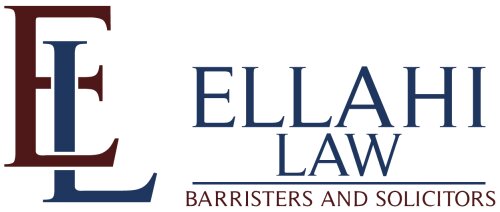Best Tax Increment Financing Lawyers in Toronto
Share your needs with us, get contacted by law firms.
Free. Takes 2 min.
List of the best lawyers in Toronto, Canada
About Tax Increment Financing Law in Toronto, Canada
Tax Increment Financing (TIF) is a financial tool used by municipalities to promote economic development and infrastructure enhancement in specific areas. In Toronto, TIF aims to encourage urban renewal and support public projects by capturing the anticipated increase in property tax revenues. Essentially, as property values in a designated area increase, the tax revenue generated by this growth is funneled back into the community to fund development projects, without increasing the existing tax rate.
Why You May Need a Lawyer
Engaging with TIF can be complex, involving multiple stakeholders and intricate legal arrangements. Here are common scenarios where legal assistance might be necessary:
- Understanding the eligibility criteria and application process for TIF projects.
- Navigating regulatory compliance and local government negotiations.
- Drafting agreements and ensuring all legal documentation meets statutory requirements.
- Resolving disputes or misunderstandings between developers, local government, or other involved parties.
- Interpreting changes in legislation or municipal policies that could impact a TIF project.
Local Laws Overview
Key aspects of local laws related to TIF in Toronto encompass a range of legal and administrative considerations. Here are some highlights:
- The City Council typically designates specific districts for TIF projects, aimed at revitalizing underdeveloped areas.
- Projects must demonstrate substantial public benefits such as infrastructure improvements, job creation, or enhanced living conditions.
- Developers and local authorities must enter legal agreements dictated by provincial statutes, like the Municipal Act.
- Public transparency and consultations are often required during the proposal and implementation phases.
- Compliance with environmental, zoning, and other municipal by-laws is critical in Toronto.
Frequently Asked Questions
What is the primary purpose of TIF in Toronto?
The main goal is to spur economic growth and urban revitalization in underdeveloped areas through a self-financing mechanism.
Who is eligible to apply for TIF support?
Eligibility typically includes developers and businesses involved in projects that promise significant public benefit and comply with city planning goals.
How does TIF work in terms of financial structure?
The initial funding for development comes from expected future increases in property tax revenues within the project area, rather than current taxes.
How are TIF districts selected?
TIF districts are designated by the City Council following analysis of socio-economic needs and potential for growth.
Are there limitations to what TIF funds can be used for?
Yes, TIF funds are primarily used for public infrastructure, environmental cleanup, housing, and amenities that enhance the district.
What is the process for approving a TIF project?
It involves proposal submission, public consultation, regulatory compliance checks, and final approval by municipal authorities.
How long does the TIF designation last?
TIF designations generally last between 15 to 25 years, depending on the specific project and legislative stipulations.
Can residential property owners benefit from TIF?
Indirectly, as TIF often results in improved infrastructure and services, potentially increasing property values and quality of life.
What are the risks associated with TIF?
Risks include project delays, revenue shortfalls, and increased competition among developers which might lead to disputes.
Do changes in government affect TIF projects?
Potentially, as shifts in political priorities can alter TIF policies, although existing agreements typically remain enforced.
Additional Resources
For further information, the following resources can be particularly useful:
- The City of Toronto’s Planning Division: Offers guidelines and procedures for proposing TIF projects.
- Ontario Ministry of Municipal Affairs and Housing: Provides a broader legislative framework applicable to TIF.
- Local Community Centers: Often have information sessions and resources regarding local development initiatives.
- Non-profit Organizations: Groups like the Urban Land Institute often publish research and best practices related to TIF.
Next Steps
If you need legal assistance in navigating TIF, consider the following steps:
- Consult with a lawyer specializing in Canadian municipal finance and real estate development.
- Engage with community associations for support and additional insights into local TIF projects.
- Attend city council meetings or reach out to municipal advisors for firsthand information on upcoming TIF districts.
- Gather necessary documentation and draft a clear plan or proposal aligned with Toronto’s urban development goals.
Proper legal guidance can help optimize the benefits of TIF for your project while ensuring the process aligns with all regulatory requirements.
Lawzana helps you find the best lawyers and law firms in Toronto through a curated and pre-screened list of qualified legal professionals. Our platform offers rankings and detailed profiles of attorneys and law firms, allowing you to compare based on practice areas, including Tax Increment Financing, experience, and client feedback.
Each profile includes a description of the firm's areas of practice, client reviews, team members and partners, year of establishment, spoken languages, office locations, contact information, social media presence, and any published articles or resources. Most firms on our platform speak English and are experienced in both local and international legal matters.
Get a quote from top-rated law firms in Toronto, Canada — quickly, securely, and without unnecessary hassle.
Disclaimer:
The information provided on this page is for general informational purposes only and does not constitute legal advice. While we strive to ensure the accuracy and relevance of the content, legal information may change over time, and interpretations of the law can vary. You should always consult with a qualified legal professional for advice specific to your situation.
We disclaim all liability for actions taken or not taken based on the content of this page. If you believe any information is incorrect or outdated, please contact us, and we will review and update it where appropriate.

















